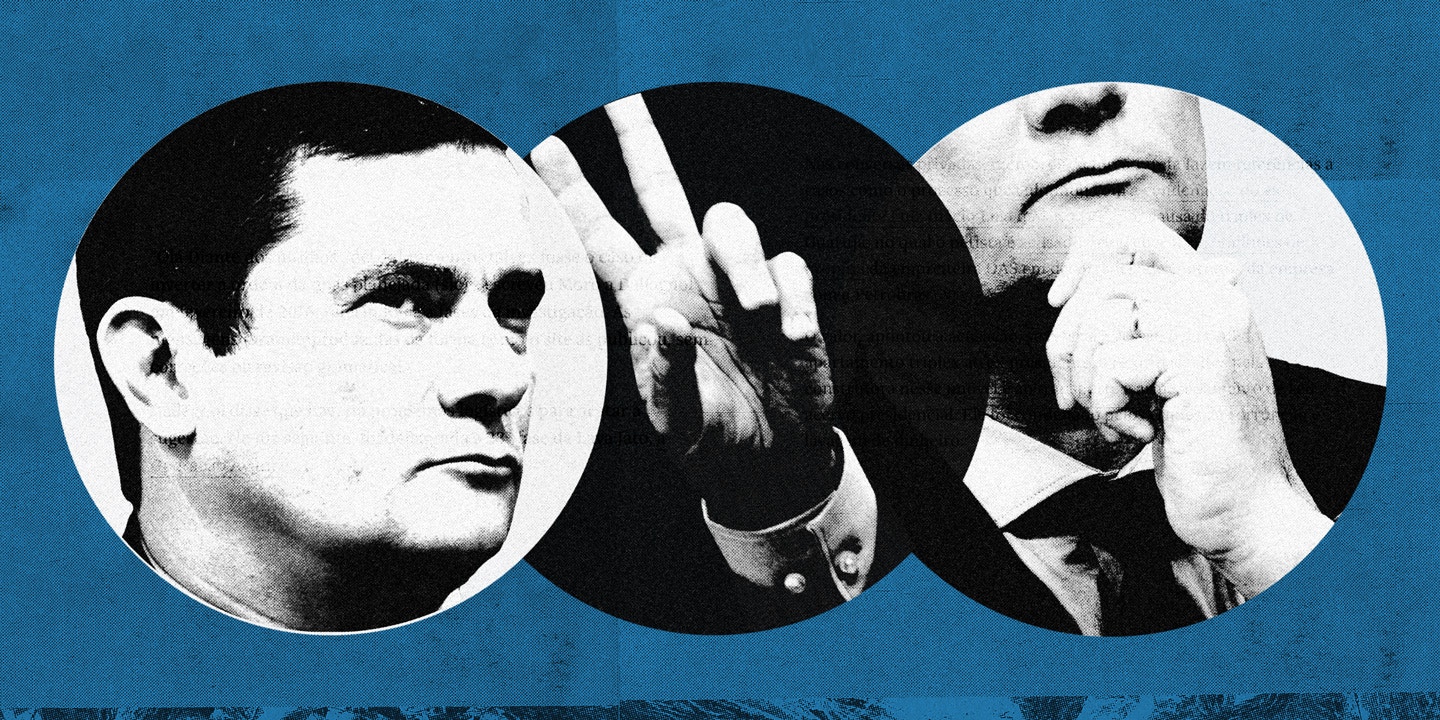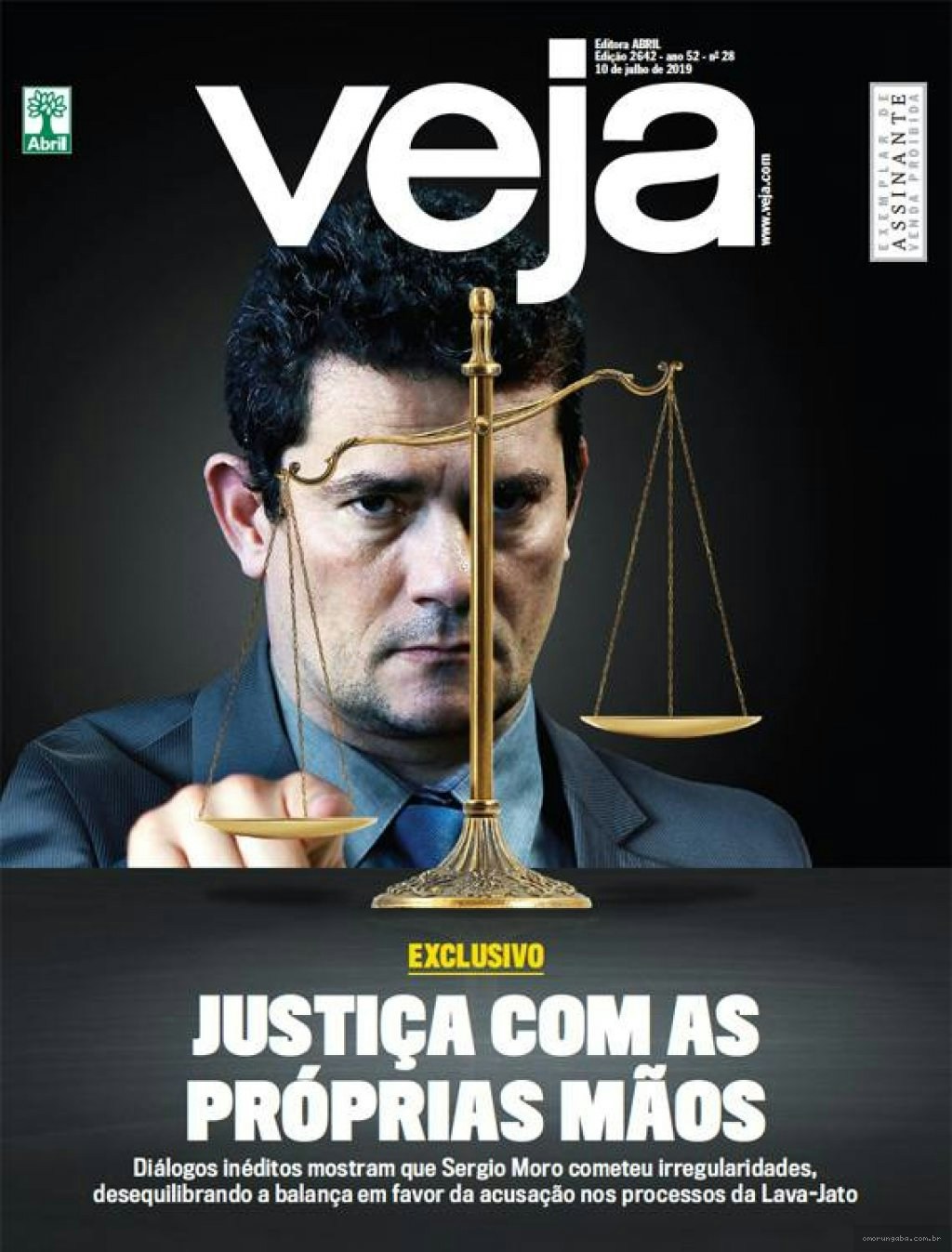
SCANDAL FOR BOLSONARO’S JUSTICE MINISTER SERGIO MORO GROWS AS THE INTERCEPT PARTNERS WITH BRAZIL’S LARGEST MAGAZINE FOR NEW EXPOSÉ
July 5 2019, 3:35 p.m.
ON JUNE 9, the Intercept began reporting a series of exposés about unethical and corrupt behavior by then-judge Sergio Moro, now the powerful Justice Minister for President Jair Bolsonaro, based on a massive archive of secret documents provided to us by an anonymous source. As the Guardian reported on Wednesday regarding retaliatory investigations launched by Moro’s Federal Police against us in an attempt to intimidate and punish us for this reporting, our articles “have had an explosive impact on Brazilian politics and dominated headlines for weeks.”
Once revered across the political spectrum, Moro – widely regarded as the linchpin of the Bolsonoro government’s credibility – is now engulfed in a deepening scandal. Two weeks ago, he defended himself for nine hoursbefore a hostile Brazilian Senate, and on Tuesday spent almost seven more hours in the Congress doing the same until his testimony was interrupted by a furious screaming match – prompted by a Congressman calling him a “thief judge” – that came close to physical confrontation:
An op-ed in the New York Times this morning by Contributing Writer Vanessa Barbara – headlined: “Where Do You Turn When the Anti-Corruption Crusaders Are Dirty?” – illustrates how rapidly and radically Moro’s reputation has fallen both in Brazil and internationally. The article summarzies the crux of our reporting this way: “All in all, the leaks reveal an immoral judge, who teamed up with electorally-motivated prosecutors, in order to arrest and convict individuals that they already considered guilty. Their only question was how best to do it.” The Times’ headline perfectly captures the essence of this scandal for the Bolsonaro government:
Moro’s key media supporters have abandoned him: the center-right paper Estadão, long one of his most vocal cheerleaders, called for his resignation after the first week of our reporting. Polling data shows that his approval rating, just after the first week of our reporting, began falling sharply. And the right-wing President of the Senate – installed in February based on an expectation that he would loyally support the agenda of the Bolsonaro government – said that Moro’s behavior was so unethical that he would be “imprisoned” if he were not the Justice Minister. The Senate has demanded that both Moro and Finance Minister Paulo Gedes appear to explain what appears to be their abuse of police power to investigate us.
This scandal has grown as our reporting has continued. To accelerate the reporting, to prevent claims that we have been ideologically selective in choosing what to disclose, and to obliterate Moro’s desperate attempt to cast doubt on the authenticity of the material in the archive, we have partnered with several of Brazil’s most mainstream journalistic outlets – including its largest newspaper, Folha of São Paulo, and a long-time right-wing journalist, Reinaldo Azevedo of the Band News radio network – to jointly report on these incriminating revelations.
But today’s events have elevated Moro’s crisis to an entirely new level. The largest weekly newsmagazine in Brazil is the center-right Veja, which has been one of Moro’s most vocal and devoted supporters for years, repeatedly putting his image on their influential covers in heroic postures. But now, Veja is also our new partner in reporting on the archive, and this morning – in partnership with us – published a devastating cover story that lays out in all-new detail, with multiple newly released private conversations involving Moro, how pervasive, sustained and comprehensive was his corruption.

Veja Cover. “EXCLUSIVE –Justice With His Own Hands: New Chats show that Sergio Moro Committed Irregularities, disturbing the scales of justice in favor of the prosecution in the Car Wash investigation”
This 8-page cover story features some of the most incriminating leaked conversations yet, demonstrating that Moro’s misconduct was not sporadic or episodic but, in the words of the article, “reveals how Moro abused his judicial function as part of a cabal, commanding the actions of the prosecutors of Car Wash.” In sum: “the communications analyzed by the Veja reporting team are true and the story shows that the case is even more grave than previously known.”
The case is even more grave than previously known.
The Guardian today – in an article headlined: “Calls grow for Bolsonaro ally to quit after ‘devastating’ report on leaks” – explains that “Moro is facing renewed pressure to resign after the country’s leading conservative magazine waded into a snowballing scandal over his role in a mammoth anti-corruption investigation that helped reshape South America’s political landscape.”
Perhaps even more significantly is the magazine’s extraordinary “Note to Readers,” in which they explain why they concluded it was their journalistic duty to expose Moro’s corruption after years of applauding him; detailed the journalistic methods used to authenticate the material; and unflinchingly described why Moro’s conduct as a judge is a grave threat to the rule of law and the pillars of democracy.
On the front page of its widely read site, the magazine accuses Moro not merely of engaging in unethical or improper acts – the words we have used thus far to describe his behavior – but also “illegal” ones. That Brazil’s largest center-right magazine, in partnership with the Intercept, is now explicitly accusing Bolsonaro’s Justice Minister of “illegalities” – based on detailed accusations proven by Moro’s own words in secret – is as significant as journalism gets.

Veja website caption: “New chats reveal that Moro illegally commanded the actions of the Car Wash prosecutors.”
Perhaps most amazingly, Veja candidly acknowledges, and clearly appears to regret, its own role in helping Sergio Moro construct a public image as some sort of super-hero, a high priest of ethics and propriety who was beyond reproach – a myth that, as we all now know, was deeply deceptive. At the top of its letter to its readers explaining why it is exposing Moro’s conduct – headlined: “About principles and values” – Veja displays five different covers over the past several years it published that heralded Moro’s virtue, along with this caption:
TREATED AS A HERO:The ex-judge Serio Moro was on the cover of VEJA in diverse situations, the majority favorable: while he has been fundamental in the fight against corruption, one cannot close one’s eyes in the face of the irregularities he committed.
In sum, Veja – along with the Intercept and Folha – has devoted massive editorial resources to exposing Moro’s misconduct in defense of a simple but crucial principle, as described by its letter to its readers: “Ultimately, nobody is above the law.” Ironically, that motto was, for years, the rallying cry of Moro’s supporters, and it is now the principle that is finally bringing serious accountability to his own grave misconduct.
This new article demonstrates – comprehensively and with finality – that the true chief of the Car Wash prosecutions was the same person who pretended to be, and was ethically obligated to be, the neutral judge: Sergio Moro, now the most powerful official in the Bolsonaro government, overseeing vast powers of surveillance, investigation and law enforcement previously dispersed among various agencies but now all consolidated under his control. Moro’s conduct was a serious corruption of the judicial system – not only for the defendants whose rights he violated but for all future defendants who are in jeopardy of a legal system that no longer requires the most basic obligation to ensure credibility and legitimacy: a neutral, impartial judge.
We began our reporting by explaining our rationale for why we believed disclosure of this massive, secret archive was so critical for Brazilian democracy. In doing so, we wrote: “Given the immense power wielded by these actors, and the secrecy under which they have — until now — been able to operate, transparency is crucial for Brazil and the international community to have a clear understanding of what they have really done. A free press exists to shine a light on what the most powerful figures in society do in the dark.”
That – transparency for the corrupt acts by powerful officials – continues to be our governing value and primary objective in this reporting. The threats from Moro and the Bolsonaro government – including the abuse of the Federal Police commanded by Moro to investigate our finances – will, needless to say, not deter the reporting in the slightest.
Quite the contrary: this new joint article with Veja, published 48 hours after news broke of the Federal Police retaliation against us, is a major advancement of our originally stated goal. With respect to the part of this story concerning Moro’s unethical, improper collaboration with the prosecutors, this latest article – on the cover of Brazil’s highly influential center-right weeky news magazine – reveals just how comprehensive, reckless, and sustained Moro’s misconduct was.






Nenhum comentário:
Postar um comentário